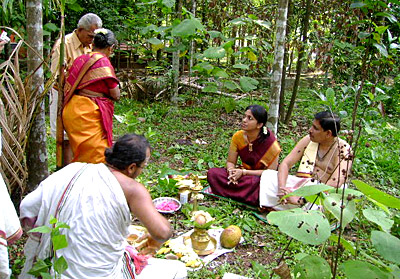 Before commencing with the construction work on a newly purchased plot it is important to cleanse it. Unnecessary stones, rubble, earth mounds, pits and others should be removed. Thorny bushes and other trees also need to be uprooted. If there are Babool (Gum Arabic tree) trees, they should be uprooted first. According to Vastu Shastra construction will be unnecessarily delayed if there is heaps of rubbish in the north-east or the south-east corners. Hence these should be removed at the earliest. In case this is not done it may result in scarcity of fund and unwanted troubles. If there is a pit at the centre or in the southeast corner or the south-west corner of the plot it should be immediately filled up otherwise the construction work will be delayed.
Before commencing with the construction work on a newly purchased plot it is important to cleanse it. Unnecessary stones, rubble, earth mounds, pits and others should be removed. Thorny bushes and other trees also need to be uprooted. If there are Babool (Gum Arabic tree) trees, they should be uprooted first. According to Vastu Shastra construction will be unnecessarily delayed if there is heaps of rubbish in the north-east or the south-east corners. Hence these should be removed at the earliest. In case this is not done it may result in scarcity of fund and unwanted troubles. If there is a pit at the centre or in the southeast corner or the south-west corner of the plot it should be immediately filled up otherwise the construction work will be delayed.
It is a necessity to worship the land before letting the construction work begins. if things, such as, bones and filthy rubbish, hair are found after digging the plot they should be removed at once. Baisakh, Shravan, Margshirsh and Falgun are the four months that are auspicious for the worship of the land.
There are certain rules to choose the auspicious moment. These are as follows:-
•If possible the auspicious moment should not coincide with the extra month (Adhik Mas), the zero month, the lunar month and sunset.
•Tuesday, Saturday and Sunday should be avoided.
•Monday and Thursday are very auspicious.
•The auspicious or the opportune moment for Bhumipuja should not be organised in the pregnancy stage i.e. after the 7th month.
•Auspicious moment should not fall during the menses period of any lady.
•The auspicious moment should not coincide with Hadpaksha, mourning period, Divaskarma and Shraadha ceremony. If the auspicious moment falls in Jaishth or Aashadh it will result in sickness or unnecessary increase in expenditure.
•If the auspicious moment is selected in the Bhadrapad or Ashwin months, expenditure increases unnecessarily and the situation becomes tense for without any reason.
•If the Bhumipuja takes place in the month of Kartik, Paush or Magh construction work will be delayed. There is also a possibility of theft. Some provoking incidents may take place.
•If there is a conjunction of auspicious stars in the sky at this specific moment it will produce good results.
• The worship of the land should be done in the east or the northeast corner of the plot at the opportune or the auspicious moment.
Beginning of Construction
First all the four directions should be marked before the construction work begins. Then the position of pits should be ascertained. The planning should be in the clock wise direction. Never start digging from the south-west direction. If it is done the owner will have to face a lot of difficulties. These problems may include delaying of the construction work, the workers remaining absent or they may be injured. It is always beneficial to dig a well before the actual construction.




















